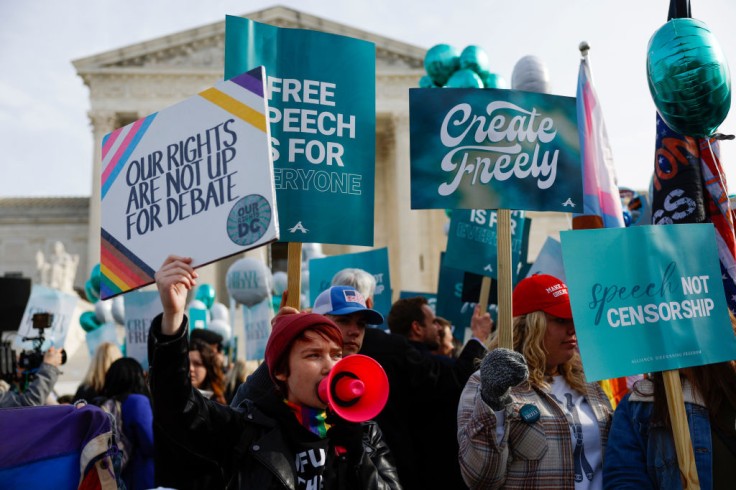
In a highly divisive decision, the US Supreme Court's conservative majority ruled in favor of allowing certain businesses to refuse services to LGBTQ customers based on their religious beliefs.
The ruling, delivered in the case of a web designer who objected to providing services for same-sex weddings, has sparked intense debate over LGBTQ rights and the limits of religious freedom.
Supreme Court Ruling Now Allows Businesses To Refuse LGBTQ Customers
According to Reuters, the Supreme Court's 6-3 ruling, split along ideological lines, has reignited the ongoing battle between LGBTQ rights and religious freedom.
The case involved Lorie Smith, a web designer based in Denver, Colorado, who argued that her Christian beliefs opposed same-sex marriage, thus granting her the right to refuse services on such occasions.
The heart of the legal dispute revolved around the clash between Smith's claim to freedom of speech and the Colorado anti-discrimination law, which prohibits discrimination based on sexual orientation and other factors.
Conservative Justice Neil Gorsuch, writing for the majority, argued that forcing Smith to provide services for same-sex weddings would violate her First Amendment rights by compelling her to create speech against her beliefs.
The Supreme Court's ruling has raised concerns among LGBTQ advocates and critics, who argue that it sets a dangerous precedent and undermines hard-fought anti-discrimination laws.
Justice Sonia Sotomayor, one of the dissenting liberal justices, warned that the decision could pave the way for widespread discrimination, not only against LGBTQ individuals but against also other marginalized groups protected under public accommodations laws.
LGBTQ Community and Critics Alarmed by the Decision
As reported by NBC News, critics argue that framing the ruling as a matter of free speech rather than religious freedom may have far-reaching consequences.
They fear it could open the door for businesses to refuse services to interracial couples, disabled individuals, or anyone else based on personal beliefs.
The ruling's immediate impact is seen as marking LGBTQ individuals as second-class citizens and inflicting harm by legitimizing discrimination.
The decision comes at a time when Republican-led legislatures in conservative-leaning states are actively pursuing laws targeting the rights of transgender and other LGBTQ individuals.
Advocacy groups have expressed concern that the Supreme Court's ruling may embolden these efforts and further erode protections for the LGBTQ community.
Axios reported that President Joe Biden, a vocal supporter of LGBTQ rights, criticized the ruling, emphasizing the importance of non-discrimination and equal treatment for all Americans.
He voiced concerns that the decision could lead to increased discrimination, not only against LGBTQ individuals but also against people of color, individuals with disabilities, people of faith, and women.
The Supreme Court has previously ruled in favor of LGBTQ rights in major cases, including the nationwide legalization of gay marriage in 2015 and the protection of gay and transgender employees from workplace discrimination in 2020.
However, the recent shift towards a more conservative majority has raised concerns among LGBTQ activists and advocates.
The US Supreme Court's ruling allowing businesses to refuse LGBTQ customers based on religious objections has ignited a fierce debate over the boundaries of religious freedom and the protection of LGBTQ rights.
The decision raises questions about the potential impact on marginalized communities and sets the stage for further legal battles on the balance between individual beliefs and anti-discrimination laws.
The long-term consequences of this ruling remain to be seen, as it has the potential to shape the landscape of LGBTQ rights and religious freedom in the United States for years to come.